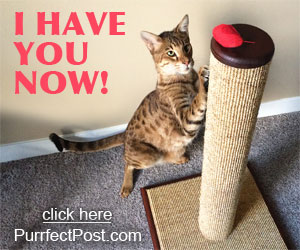Homemade Diets for Cats

Preparing homemade diets for cats rather than feeding commercially available cat foods is becoming increasingly popular. But is it safe?
Cats Are Carnivores
First and foremost, cats are obligate carnivores. This means that they can't digest plant material well enough to live on it, so vegan diets are not appropriate for them. Cats must eat meat to survive. The amino acids present in meat are complete, and unlike humans, cats don't have the ability to use plants to produce any missing amino acids.
One of the amino acids missing in a plant based diet is taurine. When cats don't get taurine, the result is severe heart disease and blindness. People do feed their cats plant-based diets and add a taurine supplement, but this is not as efficient as getting the taurine directly from a meat source.
The source of protein that you give a cat makes a big difference in her body's ability to use it. Cats evolved eating meat, and this is the protein source that their bodies use best and that provides the best health.
Raw Food Diets Carry Risks
Feeding raw food diets to cats is becoming popular. It's important to note that care should be taken by the human members of the household who are preparing the food for the cat and cleaning up after it. Salmonella, Campylobacter, and Toxoplasmosis are all organisms sometimes present in raw meat that may infect humans handling it and result in serious illness. This is especially the case for children, pregnant women, and immune-compromised individuals. These organisms may also become more prominent in the environment of a cat that is fed a raw diet.
Bones, even raw ones, have been known to cause intestinal impaction or perforation, broken teeth, and mouth injuries in cats.
Raw food diets need to include taurine and other supplements, as well.
Hyperthyroidism in Cats
Hyperthyroidism is a commonly diagnosed condition in cats. Growths in the thyroid glands lead to an increase in thyroid hormone levels. The results are increased metabolism, weight loss, increased hunger, and other signs of illness. Eventually, heart and kidney disease develop. You can learn more here: "Hyperthyroidism in Cats."
While the causes of hyperthyroidism haven't yet been completely identified, certain dietary factors such as low, high, or variable iodine levels have been implicated. You can learn more in these articles: "Fishy Food and Feline Hyperthyroidism" and "Flame Retardants and Hyperthyroidism in Cats."
When feeding a homemade diet, it's important to keep the risk factors for hyperthyroidism in mind. A cat's diet, should not be fish-based and iodine levels are extremely important.
Other Important Nutrients for Cats
There are other nutrients that are important for cats to get in their diet. These include:
- Calcium
- Vitamins B3 and B1
- Vitamin A
It's important that proper sources of these vitamins be added to a homemade feline diet, but too much can cause serious health problems, as well.
More Special Considerations
Some nutrients are degraded if they are cooked or ground, so they need to be added and mixed in at certain points while making a cat's homemade diet.
Some human foods are toxic to or not digested well by cats, so care must be taken never to add them to a cat's homemade diet. Some of these are garlic, onions, milk, and grapes. You can learn more here: "Foods Toxic to Cats."
Conclusions About Homemade Diets for Cats
If you are considering a homemade diet for your cat, be sure that you thoroughly understand what your cat needs and how you can provide it first. If your cat has any medical problems, such as kidney disease, urinary tract issues, or allergies, the homemade diet she needs will be different than if she doesn't have those conditions. A kitten needs different nutrition than an adult cat.
We strongly recommend discussing your decision to use a homemade diet with your veterinarian. He or she can go over any concerns that are unique for your cat and provide you with a recipe or a source for obtaining one (we like BalanceIt.com).
Remain Vigilant with Your Homemade Diet
If you are making homemade food for your cat, it's important that you remain vigilant and stick to the recipe your veterinarian has provided every time you make the food. It's easy to slip on certain things after a while, skipping a supplement or varying ingredients. It's important to remain strict with your cat's diet preparation.
It's also important that you watch your cat closely for any signs of a problem with the diet you are feeding her. If you are even a little bit concerned that a health problem may be developing, visit your veterinarian immediately.
You May Also Like These Articles:
Are You Shortening Your Cat's Life? - Slideshow
What Should You Do If Your Cat's Food Is Recalled?
Should Cats Get Tap or Filtered Water?
Ethoxyquin, Mercury, and PCBs: Is Feeding Fish Safe for Cats?
Should You Get Your Cat a Water Fountain?
Cats and Chocolate: Why is Chocolate Bad for Cats?
Foods Toxic to Cats - Slideshow
Notice: Ask-a-Vet is an affiliated service for those who wish to speak with a veterinary professional about their pet's specific condition. Initially, a bot will ask questions to determine the general nature of your concern. Then, you will be transferred to a human. There is a charge for the service if you choose to connect to a veterinarian. Ask-a-Vet is not manned by the staff or owners of CatHealth.com, and the advice given should not delay or replace a visit to your veterinarian.




